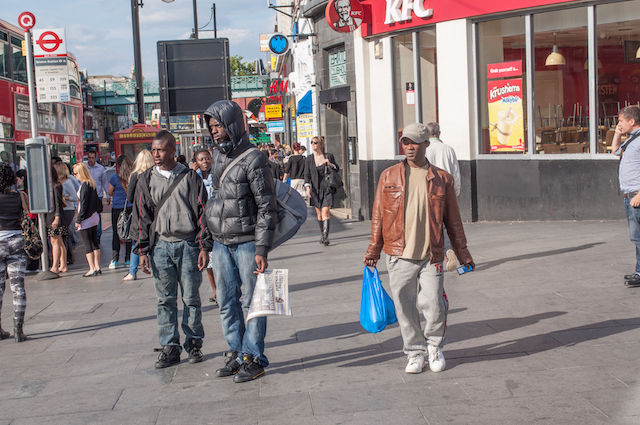Brexit was powered by fantasies of border control, the Leave campaign playing to fears of too many migrants in the UK. Lawyer Simon Cox argues that the costs of making those border controls a reality would be unprecedented.
Migration took center stage in the Brexit debate and referendum. British voters showed widespread concerns: Too many migrants, taking jobs and places in schools or hospitals.
“Take control” – the brilliant slogan of the official campaign to leave the European Union – implied that officials can enforce any rules politicians choose. The Remain campaign left this unchallenged, sticking to benefits of the single market and the value of an open and inclusive society.
This popular vision of migration control is a fantasy, based on decades of false promises by politicians who know they cannot deliver. In democracies, states cannot determine who lives where and what they do: they are constrained by practicalities and other interests. States can obstruct movement of foreigners through visas, permits, border refusals and deportation. But attempts to enforce restrictive rules that ignore realities impose enormous cost to the state – financially, economically and socially. They generate expectations that they then fail to meet.
The UK’s international migration is massive; tighter control through enforcement would be very hard: 2015 saw 100 million crossings of the UK’s supervised international borders, including 36 million by non-UK residents – not including the open land border with Ireland. This is almost entirely “self-enforcing.” Only a tiny fraction – 25,000 people – are made to leave the UK each year, and most of these people never got past the port of entry. Enforcement can impose huge costs on individuals affected, but its role in the scale of movements is minor and depends on policy compromise with mass migration.
No one knows this better than Theresa May, now in her sixth year as Britain’s Home Secretary. She makes the rules for immigration of non-EU citizens: half of all long-term migrants to the UK She repeatedly made the rules more restrictive but this immigration has only fallen 10 percent since she took office.
The Home Office depends on being free to ignore EU and EEA (European Economic Area) citizens and their families. They do not need permission to come and go, to visit, study or fill jobs. The Home Office does not need to question them at the port of entry, nor can they “overstay” or need threatening with removal. Apart from the minute proportion that commit serious criminal offenses, or are able to access social welfare despite long-term unemployment, the Home Office has no real work to do to in regard to them.

Leave voters aim to change this, expecting the state to “take control” of all the tens of millions of Europeans who arrive in the UK each year. A British border with Ireland may need to be constructed and supervised. Even Irish citizens may be subject to control for the first time ever.
Britain’s current expenditure on immigration is modest. In comparison. The UK’s net operating expenditure on immigration and borders was £800 million in the year ending 2015. The spend on immigration enforcement was just £400 million.
Prior to Brexit the government’s stated aim was to make it zero cost to the public purse. The cost involved in just attempting to deliver the promises heard on the Brexit campaign trail is hard to even calculate.
A starting point would be data on the marginal costs of increasing control, for example if a state wants to use enforcement to reduce its irregular resident population by 10 percent, what budget increase does that imply? Would additional enforcement increase costs in a way that is linear, logarithmic or something else?
The British politicians who dominated the debate didn’t even acknowledge these questions or make any attempt to be realistic about whether such a radical change can be delivered. Left, right and center all wanted to be seen as ready to “control” migration: able to deliver whatever rules the public want.
Leaders should have admitted that government rules do not “control migration”. The choices of migrants are, of course, shaped by their understanding of rules and how officials enforce them. But the volume of migration is mainly determined by other factors. Many migrants have free choices: They want to live in a country where they will prosper and feel welcome and safe. But many feel they have few choices: They must live near family, or be fleeing persecution. And when markets cannot find enough labor, they often turn to irregular migrants, those who have entered or are staying in a country without the required documentation, whose position makes them most vulnerable to exploitation.
The world is full of examples of failed attempts at control. The United States is home to 11 million irregular migrants. Europe would be too if national governments did not periodically waive migration rules for long-term irregular residents, as the UK did 15 years ago for 300,000 people. When migration policy fits reality, only small numbers evade border control. But attempts to enforce unrealistic policies fail when millions of asylum-seekers hand over billions to smugglers and their corrupt official partners, weakening the rule of law.

For 30 years, Britain’s Home Office has passed the buck to others. Threats of fines mean regular airlines now check people for visas. When this shifted asylum seekers to land routes, the Dublin regime made European Mediterranean countries responsible. They in turn tried to pass responsibility to their neighbors, like Morocco, Libya and Turkey. Yet, for the last three years, numbers arriving across the sea have not fallen, because full enforcement of unrealistic policies is only achievable through massive human rights violations. Already, false promises of control from the Home Office have led to laws creating a “harsh environment” for irregular migrants, trying to make everyone an immigration officer.
Instead of a frank conversation about the limited possibilities of enforcement, Brexit commentators tossed around the term “points-based system”, unaware the UK has had one for eight years. Rather than talk about what “control” would mean for Government expenditure on borders, politicians competed over the fake precision of “counting everyone in and out,” the size of an arbitrary numerical cap on numbers or having “points” for different skills and circumstances.
The Brexit was dominated by people with no experience of “migration control.” British people have had free movement throughout the EU and EEA for 43 years. Outside these countries, as citizens of a rich state, they rarely experience problems with officials.
Yet Britain has many people with experience of “control.” Millions came to the UK as non-EU citizens. Many experienced long delays, complex bureaucracy and high fees. Thousands were subjected to humiliating processes intended to obstruct legal migration. Families kept apart by racist officials who refused to believe them, only to be proved right by DNA tests. Thousands of asylum seekers who paid smugglers to reach safety in Britain, only to be locked up and disbelieved by officials under pressure to keep down numbers of approvals. Thousands of people paid high fees to lawyers and other advisers, with many receiving shoddy – or life endangering – advice and service.
Home Office officials could have helped British people understand why their job is hard and often ineffective. Their vans and posters that targeted irregular migrants failed amid high-profile opposition. Their rules are amazingly complex and often impossible to understand. Their decisions are often wrong, with 39 percent of appeals allowed last year. They are a small department charged with meeting impossible expectations.
Instead, the Brexit debate left millions of people with the false impression that “migration control” is easy, and that making it “tougher” will mean more jobs for British people and easier access to public services. Rhetoric from the Leave campaign led to an immediate surge in racist threats and attacks on people who look or sound “foreign.” Rules for EU citizens cannot be changed until the UK leaves the union, which will take at least two years unless Britain unilaterally breaks its Treaty promises. Without the truth being told to Leave voters about migration policy, their expectations of change in their own lives will be sky-high by the time of any actual Brexit.
Border policy and control cannot deliver the change they want. The soured atmosphere will cause many to leave Britain: more if the economy shrinks as predicted. This fall in net migration may allow politicians to claim that “control works,” but it will not change the lives of Leave voters. Emigrants – British, EU and non-EU – will be leaving skilled jobs like teaching, nursing and information technology, which can’t be filled by long-term residents at the same salaries. Costs of public and private sector will rise. And the main stressor for public services is not newly arrived migrants, but British citizens and long-settled migrants moving within the UK. The great danger is that disappointed voters turn to increasingly extreme politicians to deliver the impossible control the main parties had promised.
Despite its failures, the debate gave millions in Britain and across the world a better understanding of the issues. Despite conventional wisdom that voters do not want migration, 48 percent of voters in Britain backed a legal regime of free movement for British and other EU citizens. Academics, campaigners and lawyers filled social media with informed, detailed opinions.
Some 60 years ago, Europe was a divided continent. Communist states sought to control every aspect of people’s lives, including where they lived and worked. Western states quietly pursued a different path, in which states do not decide where their citizens may live but respond to their choices. Leaving that system will put the UK in the international spotlight on what migration control actually means.
This article originally appeared on Refugees Deeply, and you can find the original here. For important news about displacement and forced migration, you can sign up to the Refugees Deeply email list. Photographs courtesy of Joel Schalit.





